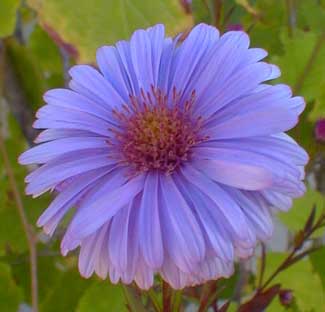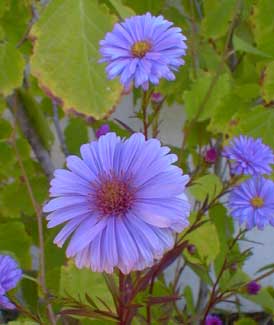
'Melody' Autumn Aster; aka,
New York Aster
or Michaelmas Daisy
"Dearest, we are like two flowers
Blooming in the garden,
A purple aster flower & a red one
Standing alone in a withered desolation."
-Amy Lowell
(1874-1925)
(1874-1925)
Aster novi-belgii 'Melody' (aka Symphyotrichum novi-belgii 'Melody') is an autumn-flowering cultivar of a native wildflower.
In Zones 4 & 5, starts should be planted out in spring; in Zone 6 they can be planted in either spring or autumn; & in zones 7 & 8 they are best planted out in late summer or early autumn.
 They like organically rich soil & can be fertilized in spring, but do not need much if any fertilizing, & should not be fertilized after they begin budding or the clump will just get lanky & tip over with too much foliage with no increase of flowers.
They like organically rich soil & can be fertilized in spring, but do not need much if any fertilizing, & should not be fertilized after they begin budding or the clump will just get lanky & tip over with too much foliage with no increase of flowers.Autumn asters are also called "natural season asters" as they are closer to the wildflower in seasonal behavior. Many of the hybrids bloom earlier, about midsummer. Natural season asters are at their height of bloom early to mid September but established clumps may start a bit sooner. Once the flowers begin, they'll continue to bloom until a good frost stops them.
The two to three foot tall spreading clump will need spring or autumn division about every three years. They need an uncrowded very sunny spot with good air circulation. Although established clumps can be quite drought hardy, stressing them with too much or too little water can invite powdery mildew.
They can be started spring or up to June in small pots from cuttings to be planted out mid to late summer. Their first year they will not need pinching, but by the following year from mid-spring to early summer they will need periodic pinching to encourage branching & compact habit, or when they are flowering about September they'll be lanky & tippy. If shoots are never pinched, the clump will be taller, a mite less floriferous, & require staking.
'Melody' is floriferous & the lavender daisy-like blossoms are very full petalled, sometimes called "duplex" or doubles. They sometimes die out of the garden due to harsh winters with too much rain, but in well-draining soil should naturalize easily, & if particularly happy can be weedy or aggressive.